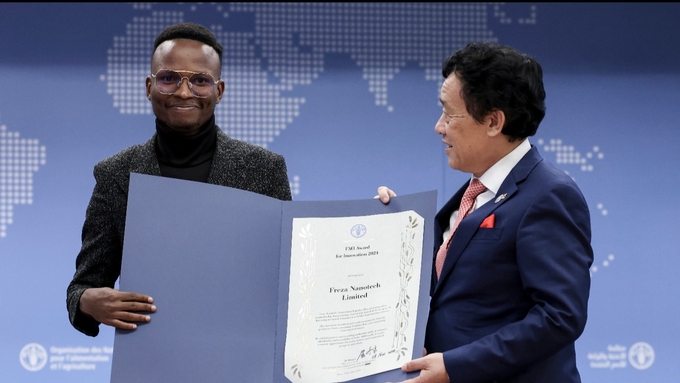June 20, 2025 | 16:59 GMT +7
June 20, 2025 | 16:59 GMT +7
Hotline: 0913.378.918
June 20, 2025 | 16:59 GMT +7
Hotline: 0913.378.918

FAO Director-General QU Dongyu presents the FAO Innovation Award to Mugisha Gift Arnold of Freza Nanotech Limited.
Freza Nanotech Limited, a startup from Uganda, has won the 2024 Food and Agriculture Organization of the United Nations (FAO) Innovation Award for developing a groundbreaking nanotechnology-based solution that extends the shelf life of fruits and reduces postharvest losses. The award ceremony took place today at FAO’s headquarters in Rome, on the sidelines of the 176th Session of the FAO Council.
Freza Nanotech’s innovative technology uses an organic formulation to inhibit the activity of phospholipase D, an enzyme involved in fruit ripening, extending fruit shelf life by up to 30 days. This emission-free solution addresses a critical challenge in the food supply chain, reducing waste and increasing the availability of fresh produce for consumers. By benefiting both farmers and consumers, the technology has the potential to make a significant impact on food security, economic development, and environmental sustainability.
“Their efforts demonstrate that agrifood systems can be both productive and sustainable, contributing to better nutrition and improved livelihoods in Uganda and beyond,” said FAO Director-General QU Dongyu during the award ceremony. “Showcasing best practices and innovative solutions like those of Freza Nanotech is important because of their positive impact on production, nutrition, environment and livelihoods, and their contribution to the Four Betters: better production, better nutrition, a better environment and a better life – leaving no one behind,” he added.
The company’s technology has been particularly transformative for smallholder farmers in Uganda, enabling them to reduce postharvest losses, improve their yields, and stabilize fruit prices. Consumers benefit from the increased availability of fresh produce at more affordable prices, while the environment benefits from reduced food waste and lower emissions associated with food spoilage.
Mugisha Gift Arnold, Chief Operating Officer and Co-Founder at Freza Nanotech, emphasized that receiving the award not only recognizes the team's commitment but also symbolizes how innovative technological solutions can have a significant impact on global challenges, particularly in food security and sustainability. He highlighted how the technology developed by his company is contributing to improving food availability and supporting economic growth, making a tangible difference in people's everyday lives.
The FAO Innovation Award is part of the FAO Awards Programme, which honors organizations, individuals, and institutions whose innovations contribute to the transformation of agrifood systems and the achievement of the Sustainable Development Goals (SDGs). The ceremony today at the FAO Council underscores the role of innovation in addressing global challenges and driving sustainable development in agriculture worldwide.
(FAO)

(VAN) Poultry production in Poland, which has only started recovering from devastating bird flu outbreaks earlier this year, has been hit by a series of outbreaks of Newcastle disease, with the veterinary situation deteriorating rapidly.

(VAN) Extensive licensing requirements raise concerns about intellectual property theft.

(VAN) As of Friday, a salmonella outbreak linked to a California egg producer had sickened at least 79 people. Of the infected people, 21 hospitalizations were reported, U.S. health officials said.

(VAN) With the war ongoing, many Ukrainian farmers and rural farming families face limited access to their land due to mines and lack the financial resources to purchase needed agricultural inputs.

(VAN) Vikas Rambal has quietly built a $5 billion business empire in manufacturing, property and solar, and catapulted onto the Rich List.

(VAN) Available cropland now at less than five percent, according to latest geospatial assessment from FAO and UNOSAT.

(VAN) Alt Carbon has raised $12 million in a seed round as it plans to scale its carbon dioxide removal work in the South Asian nation.